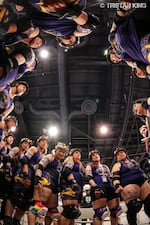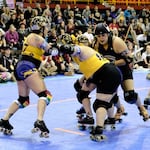The skaters huddle together in front of the scoreboard. A roller derby tradition, the winning and losing teams stand intermixed, all smiling, still wearing knee pads, skates — all their gear. A few skaters wear gold chrome helmets — a signature of the team’s pre-pandemic uniform that has persisted through a multi-year derby drought. Team Jewish Roller Derby is back.

In this provided photo, Team JRD prepares for a bout in 2019. Tiggz Dudinsky wears number 97 on her armband. And Jodi Bon Jodi is on the bottom right, with “never again” written on her leg. Morgan Levy stands to the left of Jodi Bon Jodi.
Courtesy of Tristan King
The Portland-founded team is made up of skaters from the Pacific Northwest and beyond. They travel all over the United States, and sometimes across the world, to compete and find power in their community. And as they carve out a space for themselves in the world of roller derby, they have helped to redefine the concept of what it means to be a team in the world of sport itself.
Roller derby is a full-contact sport played on quad roller skates. Modern flat track roller derby was created and is dominated by women, nonbinary and gender expansive people. If you’d like to understand more about the basics of roller derby and how the game is played, watch this video created by the Women’s Flat Track Derby Association, and check out Portland’s local league, the Rose City Rollers. Jewish Roller Derby’s fellow borderless teams are Team Indigenous Rising and Black Diaspora Roller Derby.
A team is born
Tiggz Dudinsky was at the 2018 Roller Derby World Cup when she first had the idea for a new team. Dudinsky and her wife, a skater and coach respectively, had just finished competing for Team Russia.
Months before the World Cup, when Dudinsky first learned that Team Russia was preparing to enter the international tournament, “I jumped at the opportunity,” she said. “My family has always identified as Russian Jews.”
But her path to the World Cup wasn’t a smooth one.
Russia forbids same-sex marriage, has strict anti-LGBTQ+ laws, and an ongoing history of officially sanctioned and informal antisemitism.
“I’m also married to a Russian national, but because we are in a queer relationship, our marriage is not recognized,” Dudinsky said.
Related: From skateboards to roller derby, Portland zine works for equity on wheels
So, Dudinsky took matters into her own hands.
“I wrote to the Roller Derby Nations’ committee and asked for an exception. Like, I am Russian, here’s how my family has identified. Here is who I am married to. Here are the reasons why I’m not a Russian citizen, and they granted me the exception. And I was very fortunate to go to Russia and practice with the team in St. Petersburg,” she said.
But something was still missing. Looking around at Team Russia, she said, “I just was like, OK. I can see myself among some of my teammates here, but I don’t see myself fully represented by everybody here. And that’s fine. Jews are diasporic people,” said Dudinsky.
Later in the 2018 tournament, Dudinsky was inspired when she watched Team Israel take on Team Romania.
“Watching people on Team Israel, I saw people who looked like me, I saw people who had the same hair as me,” Dudinsky said. “I saw people who I know for a fact share the same traditions and cultural ways as me.”
Dudinsky sent a message to her friend and fellow Portland skater Jodi Kansagor, and “I was like, ‘Hey, what do you think about starting Jewish Roller Derby?’”
Kansagor, who skates under the name Jodi Bon Jodi, was quick to support the idea.
“What came out of those conversations was a desire to have a World Cup team that felt more like it fit with our identities,” Kansagor said.
The timing felt right for both skaters. “It was just kind of like, let’s just do the thing and if you build it, they will come,” Dudinsky said. “And they did.”
A new concept in sport: borderless nations
Team Jewish Roller Derby formed in 2018, and joined the ranks of teams pioneering a revolutionary new concept in sport: borderless nations.
“We kind of were able to, like, redefine what it meant to be a nation in the world,” said Kansagor.
Borderless teams are formed based on cultural identity instead of political or geographic boundaries. These teams allow skaters to come together and find connection, understanding, strength and visibility with their community.
Team Indigenous Rising, also co-founded by skaters with Portland ties, created the first borderless team. “They were kind of a model for us,” said Kansagor.
“They encountered a lot of pushback in trying to be recognized for things like the World Cup and Battle of the All-Stars,” said Morgan Levy, another Portland skater who has been part of Jewish Roller Derby since the team first formed.
“Team Indigenous did a lot of the work for both Black Diaspora Roller Derby and Jewish Roller Derby by fighting to be recognized,” Levy said.
And despite all of that work, “borderless teams are still not recognized as legitimate by some people in the sport,” said Levy. But Team Indigenous, Team Jewish and Black Diaspora Roller Derby continue to compete, even as they face opposition.
Push play to watch a video featuring skaters from Team Indigenous:
Empowerment in community
“It felt empowering,” Dudinsky recalled of the first time Team Jewish Roller Derby took the track together. “There’s something really magical about coming together with your own brethren, and not even having to say a word and just knowing.”
“I think there was, like, a lot of crying,” said Kansagor. “Being able to be around other people that have this commonality, like overlap in your upbringing, overlap in your education, overlap in like your family’s traditions is really awesome.”
Also important to Kansagor and Dudinsky was making sure “that people who maybe didn’t feel welcome in other parts of Jewish communities were welcome in Jewish Roller Derby,” said Kansagor.
“My dad is Jewish, so I was not raised Jewish,” said Levy. In many traditions, Jewishness is passed down through mothers to their children and not through fathers.
“I thought [skating with JRD] was a cool opportunity to connect with other Jewish people in the sport and connect with my own Jewish heritage in that way,” she said. “My dad is very excited that I skate with Jewish Roller Derby, and I’ve always skated under my real name, my legal name. So it’s definitely meaningful to me to have Levy on my jersey for that team specifically.”
In 2019, Team Jewish Roller Derby faced off against Team Indigenous Rising in a first-of-its-kind “game without borders” matchup at the roller derby international championships in Montreal.
Team Indigenous took the win. But the bout represented something bigger than a final score.

In this provided photo, Team JRD competes against Team Indigenous in 2019. Dudinsky wears number 97 on her armband.
Courtesy of Jim Vernier
Playing against Team Indigenous has repeatedly moved Dudinsky to tears, she said. “I don’t need to say anything to these people. We get each other.”
Dudinsky also recalled a skater who approached her in tears after the bout. “They were like, ‘This was the coolest thing I’ve ever seen. I’ve never seen myself represented in such a strong, athletic way.’”
“I think roller derby breaks a lot of stereotypes about who women are and what women can do,” said Kansagor. “And there’s some pretty distinct stereotypes of who Jewish women are. And none of these stereotypes make Jewish women look strong or athletic or physically able. So to create a Jewish roller derby team where we are showcasing the athletic ability of all these Jewish women and non-binary folks, that was also shifting a paradigm.”
Dudinsky stressed the importance of this kind of visibility.
“I hope that skaters from these diaspora groups can see our teams and think, ‘Wow, that could be me, and I’m being valued for who I am,’” Dudinsky said.

In this still taken from video, skaters from Team Indigenous Roller Derby are featured in a zine titled "Smash the Skatriarchy" in 2019.
Eric Slade / OPB
On the flip side, “We shouldn’t need to have these teams,” Dudinsky said. “We should just feel comfortable within our own spaces. But that’s not always the case.”
“Most people that live in diaspora didn’t choose this, right? Like as Jewish people, we were expelled from the places that we lived and we ended up in other places,” Kansagor explained.
“But I do think that it’s a beautiful thing for us to be flipping that and claiming it as an identity and finding strength and togetherness and community within the diaspora,” she continued. “I’m here and we can find beauty and connectedness, even if it was originally something that we were forced into.”
Back on the track
As roller derby begins to return for the first time since the pandemic began, borderless teams have started to serve yet another purpose for skaters: a way to skate when there isn’t a local team geographically available.
Morgan Levy currently skates for both Jewish Roller Derby and the Rose City Rollers, Portland’s local league, which is also one of the largest leagues in the world. But after pandemic shutdowns, not every league had the resources to successfully return to derby in the way Rose City did.
“Many leagues around the world have lost most of their membership, and a lot of leagues have lost their practice spaces,” Levy explained. “So the existence of teams like [Jewish Roller Derby], where people don’t need a home league to still come together and compete with a group of like-minded individuals from similar backgrounds — I can see how special it is for players to have this opportunity when they may not have a local league to go back to.”
Team Jewish Roller Derby is currently fundraising for its 2023 season. The team competed in the Y’Allstars Southern Skate Showdown Tournament in February where it once again met Team Indigenous Rising. This time, Jewish Roller Derby took the victory.
Dudinsky, a 13-year derby veteran, is looking forward to the future of her sport.
“To see the good progress we’re making now, I feel hopeful,” she said. “I’m hesitant, but I feel hopeful. And it feels good to know that we’re doing it alongside folks from Black Diaspora and Team Indigenous.”
Team Jewish Roller Derby is looking forward to future matchups with their fellow borderless teams this season, and continuing to redefine not just roller derby, but sport itself.
Editor’s note: Emily Hamilton, who wrote this story, is a roller derby athlete with the Rose City Rollers.
